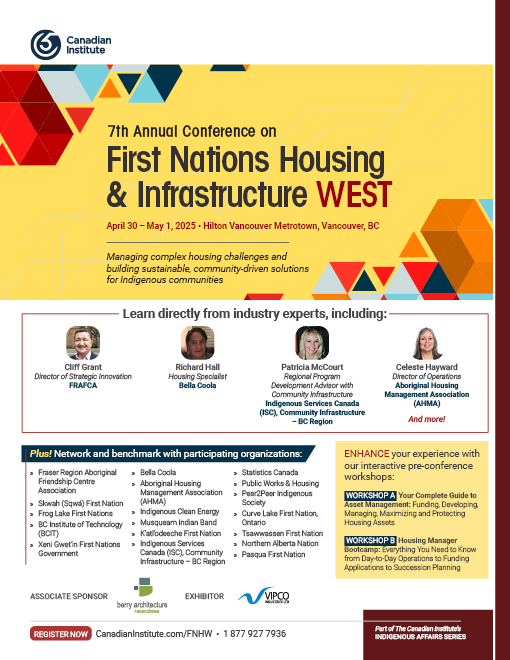Agenda

Flip through our conference brochure and discover what’s new this year.
Download Brochure
Pre-Conference Workshops
April 29, 2025
Day 1 – Main Conference
April 30, 2025
Registration and Continental Breakfast
Setting the Stage for Innovation in Housing

Taylor BakerExecutive CouncilorTsawwassen First Nation

Rajan SandhuHousing PlannerTsawwassen First Nation
Hear directly from community Chiefs as they address the most urgent housing challenges including overcrowding, homelessness, and the need for safe, accessible housing for Elders and children.
This dynamic discussion will explore real-world solutions and strategies to drive meaningful progress in Indigenous housing.
Topics of discussion will include:
- Identifying key factors for building safe, stable, and resilient housing
- Establishing clear criteria to ensure affordable, long-term housing solutions
- Strengthening community-led initiatives to create sustainable housing models
Morning Wellness Break
Advancing Sustainable Development Through Cultural Knowledge and Innovation

Olaf NielsenCFBC Project CoordinatorConstruction Foundation of BC

Richard HallHousing SpecialistBella Coola
Uncovering the Past to Shape the Future: The Growing Impact of Archaeology in First Nations Projects

Darryel SowanDirector of LandsNorthern Alberta Nation
This session considers the transformative role of archaeology in shaping First Nations land use, resource management, and infrastructure projects, as reconciliation efforts drive its integration. Hear directly from industry, government, and legal experts on how archaeology influences development and foster collaboration.
Topics of discussion will include:
- Exploring how archaeology informs land use and resource development through UNDRIP and reconciliation efforts
- Understanding archaeology’s growing role in collaborative projects between First Nations and industry
- Examining the Blueberry decision and its impact on improving consultation practices and First Nations’ involvement in archaeological processes
Networking Luncheon

Paul AndrewSeabird Member and Councillor, and the Strategic Initiatives DirectorSts’ailes

Richard HallHousing SpecialistBella Coola

Maggie KontonisManager, Infrastructure & Capital ProjectsMNP
With First Nations representing the fastest-growing demographic in Canada, the housing crisis on reserves is approaching critical levels. An estimated $30 billion is required to address backlogs in repairs and upgrades, yet funding for new builds remains insufficient. This session explores strategies to overcome funding roadblocks, maximize resources, and access innovative financing solutions for housing and infrastructure development. Topics of discussion will include:
Navigating Housing Funding Challenges
- Developing strategies to maximize existing funding for housing needs
- Overcoming barriers to identify and secure new funding opportunities
Infrastructure Financing Solutions
- Understanding certification requirements to access long-term, fixed-rate financing through the First Nations Finance Authority
- Exploring options to borrow from the global bond market for financing infrastructure over its lifespan
Building Stronger Housing Departments with Effective Policies for Rent Collection, Maintenance, and Long-Term Sustainability

Rhonda BrownHousing ManagerSkwah (Sqwá) First Nation

Caroleen StevensonHousing ManagerPasqua First Nation
Establishing clear, enforceable policies is necessary for maintaining safe, sustainable, and well-managed communities. This session will provide key insights on refining housing processes, upgrading policies to meet evolving needs, and implementing best practices for rent collection, maintenance, and long-term asset management.
Topics of discussion include:
- Identifying lessons learned from the last few years and any changes to your housing processes
- Determining what needs to be reviewed and upgraded to better reflect your community’s current
- Managing housing portfolios effectively through best practices
- Developing and implementing robust policies for rent collection and maintenance
Wellness Break

Edmund HainesHousing ManagerXeni Gwet'in 1st Nations Gov't

Kevin MitchellDirectorPublic Works & Housing
This session focuses on strategies for hiring and training contractors in communities with limited access to skilled labour, especially in post-disaster recovery. With high demand for housing repair and construction, learn how to overcome shortages by developing a local workforce and creating training programs to meet specific housing needs.
Topics of discussion will include:
- Hiring contractors in high-demand areas and attracting skilled labor in resource-limited communities
- Training local workforce to build capacity and address housing needs
- Overcoming shortages with practical solutions for managing housing projects with limited contractor pools
Closing Remarks
End of Day One
Day 2 – Main Conference
May 1, 2025
Registration and Continental Breakfast
Opening Remarks from Conference Co-Chairs
NEW! Smart Housing Solutions: Breaking Down Barriers to Sustainable, Affordable, and Culturally Aligned Indigenous Communities

Cliffton CrossCouncil MemberFrog Lake First Nations

Stan KnightOwnerInspector in a Box

George BerryFounderBerry + Architecture Associates

Richard HallHousing SpecialistBella Coola
This session explores innovative approaches to designing energy-efficient, cost-effective, and culturally frounded housing solutions that meet the unique standards of Indigenous communities . Session leaders will address key challenges such as lack of support for Indigenous trades, high housing costs stemming from government policies, and the need for better building science education and energy-efficient retrofit standards. Participants will learn about the latest updates to the housing booklet released in October 2023, including retrofit standards and educational videos designed to connect generations around housing development.
Topics of discussion will include:
- Building Trades Capacity by overcoming funding gaps to support Indigenous trades
- Reducing Housing Costs by Addressing government policies that drive up housing prices
- Implementing clear targets and tools for energy-efficient homes
- Promoting building science and retrofit programs for Indigenous trades
- Minimizing construction costs by utilizing local materials
- Reducing the carbon footprint in housing projects through sustainable practices

Gary PritchardConservation Ecologist & Indigenous Engagement/Placemaking SpecialistCurve Lake First Nation, Ontario
This high-energy session is designed to help housing professionals building meaningful relationships, expand their networks, and collaborate on innovative solutoins. Through a dynamic mix of rapid networking techniques, targeted discussions, and interactive exercises, participants will gain the skill and confidence to connect, exchange, and develop partnerships that drive lasting change.
Quick Networking Essentials:
- Master key strategies to initiate conversations confidently
- Leverage your network for career growth, funding opportunities, and collaboration
Targeted Networking Exercise:
- Break into small groups based on specific housing focus (e.g., funding, design, community engagement)
- Discuss pressing challenges and co-develop solutions
- Identify new partnership opportunities and exchange contacts
Speed Networking Rounds:
- Engage in rapid 2-minute introductions to maximize connections
- Share your biggest housing challenges and explore potential solutions with peers
Wellness Break
Networking Luncheon

Lenny KishiHousing AccountantMusqueam Indian Band

Montek GharialResearch AssociateBC Institute of Technology (BCIT)
Managing housing assets effectively is key to sustaining and improving First Nations communities. This session dives into the practicalities of understanding your housing portfolio as a financial asset, evaluating its true value, and implementing actionable plans to ensure long-term benefits for your community.
Topics of discussion will include:
- Leveraging Housing as a Financial Asset:
- Analyzing the financial impact of housing on community sustainability
- Identifying strategies to use housing assets for generating economic opportunities
- Evaluating and Document Asset Values:
- Conducting detailed assessments of housing assets’ current and replacement values
- Establishing an inventory system for better tracking and valuation of assets
- Implementing a Targeted Action Plan:
- Developing a step-by-step plan to maintain, repair, and upgrade assets
- Prioritizing investments that align with long-term community goals
STATISTICS CANADA TELL-ALL

Alexandria MelvinIndigenous Liaison AdvisorStatistics Canada
This session provides the tools to leverage Statistics Canada’s housing data, supporting the development of resilient, data-driven strategies for communities. Learn about housing data available at Statistics Canada, analytical products and key findings, and available resources to support accessing data and building statistical capacity to address housing challenges across the country.
Topics of discussion will include:
- Understanding the Census of Population, the Canadian Housing Survey, and the Indigenous Peoples Survey
- Exploring data from the Census of Population, the Canadian Housing Survey, and the Indigenous Peoples Survey
- Selected findings will be presented, focusing on housing indicators such as housing suitability, housing adequacy, and core housing need
- Navigating Statistics Canada’s website with a focus on accessing housing statistics, data tools and analytical products
- Learn about available resources for data users, including assistance accessing data and building data and research capacities
Empowering the Next Generation: Strengthening Youth Policy and Preventing Indigenous Youth Homelessness

Matthew MorinJr. AdminAboriginal Housing Management Association (AHMA)

Bailey WaukeyYouth Policy AnalystAboriginal Housing Management Association (AHMA)
This session will showcase how the Aboriginal Housing Management Association (AHMA) created the Indigenous Youth Housing Strategy (IYHS) in a For Indigenous Youth, By Indigenous Youth (FIYBIY) way. From recruiting five young Indigenous leaders to work alongside us for six months to providing workshops for 102 Indigenous youth participants, the IYHS will provide the sector with an engagement framework to replicate these results in your community. Lastly, we will share our research about the state of Indigenous youth housing in BC and highlight the five FIYBIY housing models created by the IYHS Steering Committee, for which AHMA is working to mobilize funding to pilot in partnership with our membership.
Topics of discussion include:
- Best practice Indigenous youth housing models
- Indigenous youth engagement framework for housing responses
- Where to begin your organization’s journey in youth housing.
- How to mentor young Indigenous housing leaders.



